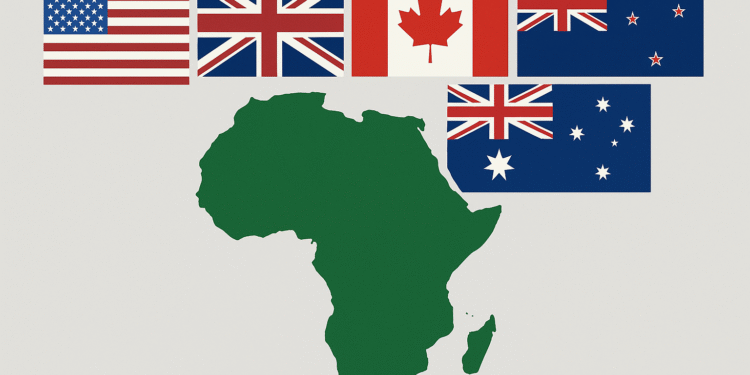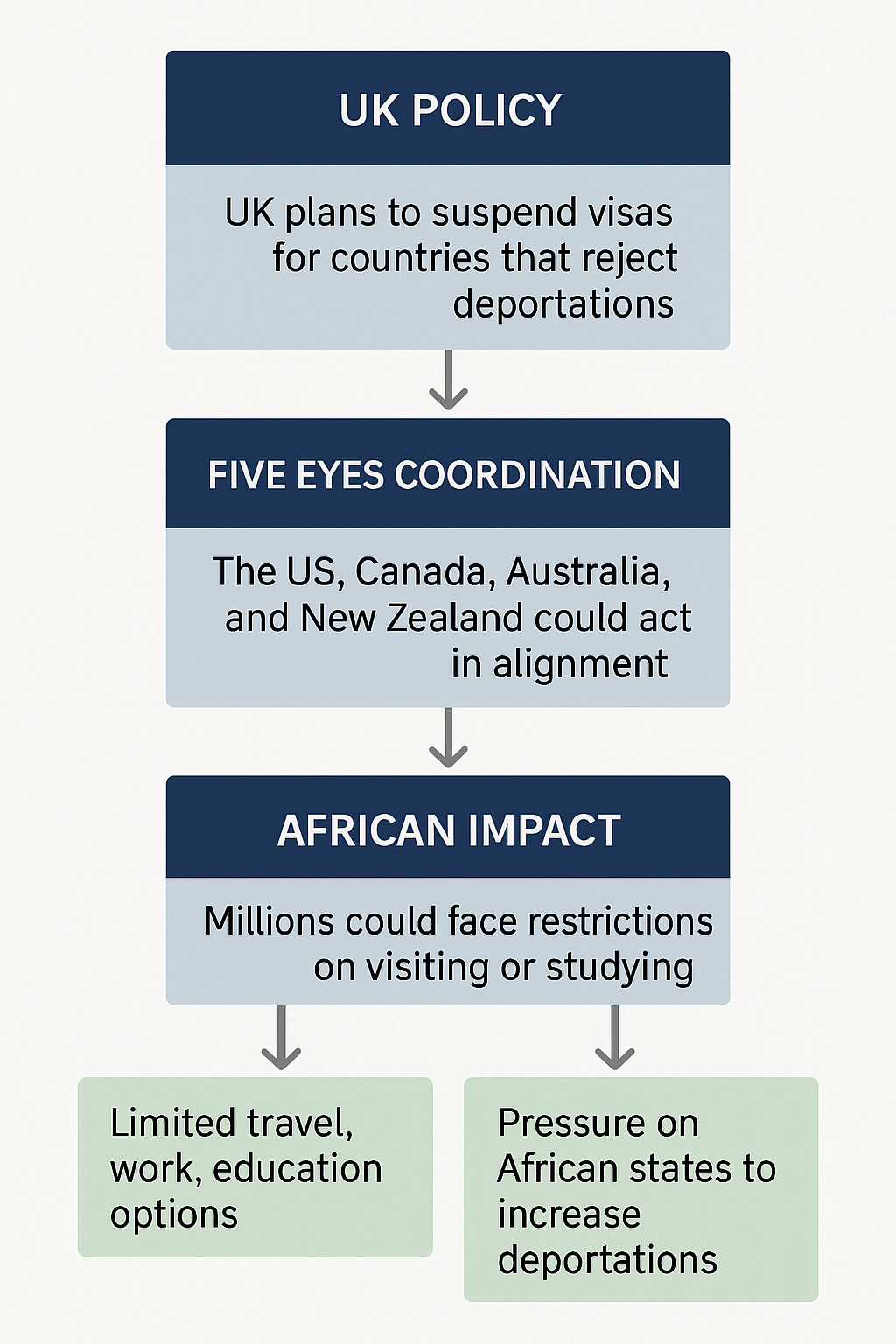UK Visa Suspension Africa: The announcement by the UK’s new Home Secretary, Shabana Mahmood, that visas could be suspended for countries refusing to accept deported citizens marks a sharp policy shift. By linking immigration enforcement directly with visa policy, the UK signals a move toward transactional diplomacy—where access to mobility is traded for cooperation on returns.
For African states, particularly Nigeria—the largest source of migrants to the UK—this development raises profound legal, political, and human consequences. The situation becomes even more significant when viewed through the lens of the Five Eyes alliance (UK, US, Canada, Australia, New Zealand). If these states coordinate, the implications for African mobility could be transformative.
Legal Dimensions: Sovereignty Versus Enforcement
At the heart of this debate lies a legal tension between state sovereignty and international cooperation.
- From the UK’s perspective, every sovereign state has the right to control entry and demand that foreign governments take back their citizens once deportation orders are final.
- From the perspective of African states, forced returns raise humanitarian, logistical, and constitutional concerns. Deportees may face persecution, statelessness, or lack of due process in their countries of origin.
Nigeria, for example, has long resisted blanket acceptance of returnees without verification of nationality. This is consistent with international law, which requires states to avoid rendering individuals stateless. Yet the UK now appears prepared to penalise such resistance with visa suspensions.
This approach tests the boundaries of international human rights obligations and may put African states in conflict between protecting citizens abroad and preserving access to visas for legitimate travellers.
Diplomatic Leverage and the Five Eyes Factor
The decision to raise this issue within the Five Eyes forum is not incidental. By framing migrant returns as a security issue, the UK elevates the conversation from bilateral disputes to multilateral coordination among powerful allies.
For Africans, this is critical. Visa access to the UK alone is significant, but when combined with potential restrictions across Canada, the US, Australia, and New Zealand, the leverage multiplies. These five states collectively represent:
- Major destinations for African students, professionals, and asylum seekers.
- Key sources of remittances back to Africa.
- Political allies whose collective stance can influence international norms.
If these countries align their visa policies, African governments could find themselves forced into compliance, not through traditional diplomacy but through the coercive power of mobility restrictions.
Implications for Nigerians Abroad
Nigeria, with its large diaspora in the UK, is at the centre of this policy shift. The UK is a top destination for Nigerian students (over 65,000 study visas issued in 2023) and workers under the Skilled Worker route. Visa suspensions or restrictions would:
- Disrupt education pipelines – limiting opportunities for thousands of young Nigerians who rely on UK universities.
- Affect professional migration – undermining access to critical labour markets in healthcare, technology, and finance.
- Strain families – visitor and settlement visas could be delayed or suspended, complicating family reunification.
The Nigerian government will face a stark choice: increase cooperation on deportations or risk significant losses in education, remittances, and mobility for its citizens.
Political and Security Context
The immediate trigger for Mahmood’s remarks is the surge in small boat crossings across the English Channel—over 30,000 arrivals in 2025, a 37% rise from the previous year. Many of those crossing are from Afghanistan, Sudan, Eritrea, and Nigeria.
The UK government faces domestic pressure to demonstrate control. By signalling tougher policies, it aims to reassure British voters that migration is managed. Yet, for Africa, this turns a UK domestic political crisis into a continental diplomatic challenge.
African states risk becoming collateral players in the UK’s internal debates about asylum and border control.
Economic and Development Dimensions
Remittances from diaspora communities in the UK and other Five Eyes countries are a lifeline for many African economies. For Nigeria alone, remittances amounted to $20 billion in 2022, according to the World Bank.
Visa suspensions would:
- Reduce new migration flows, cutting future remittance potential.
- Disrupt knowledge transfer and skills development.
- Create secondary effects in African economies already struggling with foreign exchange shortages.
The cost of non-cooperation on returns, therefore, is not just diplomatic isolation—it is economic loss on a national scale.
Risks of Precedent and Global Copycats
Another underexplored dimension is the precedent this sets. If the UK and Five Eyes succeed in weaponising visas as leverage, other powerful blocs—such as the European Union—may follow. African governments could find themselves facing a network of coordinated restrictions unless they align with Western migration enforcement priorities.
These risks deepening global inequality in mobility, where African passports—already among the weakest for travel freedom—become further devalued.
Policy Options for Africa
So, how should African states, and Nigeria in particular, respond? Several strategies are possible:
- Strengthened Bilateral Engagement – Negotiating structured returns agreements that balance UK demands with protections for citizens.
- Pan-African Coordination – Using regional bodies like the African Union to develop a unified response and prevent states from being pressured individually.
- Leveraging Reciprocal Interests – Reminding the UK of its strategic reliance on Africa in areas like energy, trade, and security cooperation.
- Diaspora Diplomacy – Mobilising African diasporas to advocate within Five Eyes countries, highlighting the contributions of migrants rather than framing them as threats.
Conclusion: Africa at a Crossroads
The UK’s threat to suspend visas for countries not cooperating on migrant returns is more than a domestic immigration policy. It is a diplomatic lever that, if coordinated with the Five Eyes alliance, could reshape the global mobility landscape for Africans.
For Nigeria and other African states, the challenge is not merely technical—how to process deportees—but strategic: how to preserve sovereign rights, protect citizens abroad, and maintain access to international mobility in a world where visas are increasingly used as geopolitical bargaining chips.
This moment calls for measured diplomacy, regional solidarity, and forward-looking policy. Without such strategies, millions of Africans could find their futures constrained not by personal merit or opportunity, but by the shifting tides of international migration politics.












